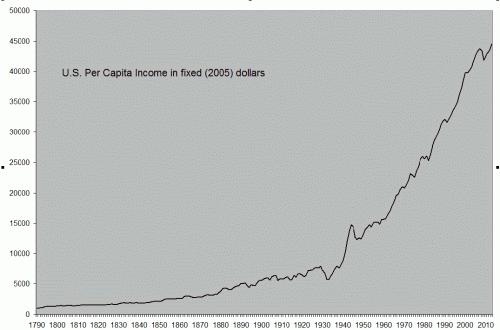We’ve had a very long recent thread about the social costs and benefits of high frequency trading, where I’ve apparently managed to confuse a number of readers by switching back and forth, according to the convenience of the moment, between two different, but perfectly legitimate, social accounting systems.
To clarify matters, let’s forget for the moment about high frequency trading and look at something simpler — innovation in the IT industry, where it’s clear that profit-maximization can easily lead to too much innovation. I’ll do the accounting both ways to make it clear that both ways are right.
First, the assumptions:
Alice has developed a word processor, which she sells online. It costs her $5000 a year to maintain a server, where you can download a copy for $1000. She sells 100 copies a year, and therefore collects $100,000 in revenue. Most of the consuemrs who buy those copies value them at more than their price. In fact, the total value of those 100 copies to the consumers is $200,000.
Bob has an idea for a word processor that’s a little better than Alice’s, so that each consumer would be willing to pay $10 more for Bob’s than for Alice’s.
If Bob develops his word processor, how much can Alice charge for hers? Because her word processor is inferior to Bob’s, she’s got to undercut his price by $10 in order to maintain any customers at all. So if Bob charges $600, Alice charges $590. But then Bob can steal all of Alice’s customers by lowering his price to $599.99, whereupon Alice must lower her price to $589.99, whereupon Bob steals all her customers by lowering his price another penny….and the race to the bottom is on. But Alice’s price cannot fall below $50, because then she wouldn’t earn enough to cover her server costs. So Alice, who is smart enough to foresee all this, gives up and cedes the market to Bob.
Once Bob has the market to himself, he doesn’t have to worry about re-entry by Alice, because they both know perfectly well that the instant she renews her server contract, the race to the bottom will be back on and she’ll have spent $5000 for nothing.
Now if Bob sells his word processor for $1000, it’s he instead of Alice who earns $100,000 a year in revenue and therefore (after subtracting the server cost) $95,000 in profit. He weighs this against the $80,000 cost of developing his word processor and takes the plunge.
I claim that Bob’s decision is privately wise (i.e. wise from Bob’s point of view) and socially foolish (i.e. it reduces social welfare, defined as the total dollar value of all the gains to consumers and producers). We can calculate the costs and benefits of Bob’s decision in either of two equally legitimate ways. Because they are equally legitimate, they lead to the same bottom line: Bob’s private benefit exceeds his private cost by $15,000 (which is why he plunges ahead), while the social cost exceeds the social benefit by $79,000 (which is why we wish he wouldn’t).
Continue reading ‘Social Accounting’











